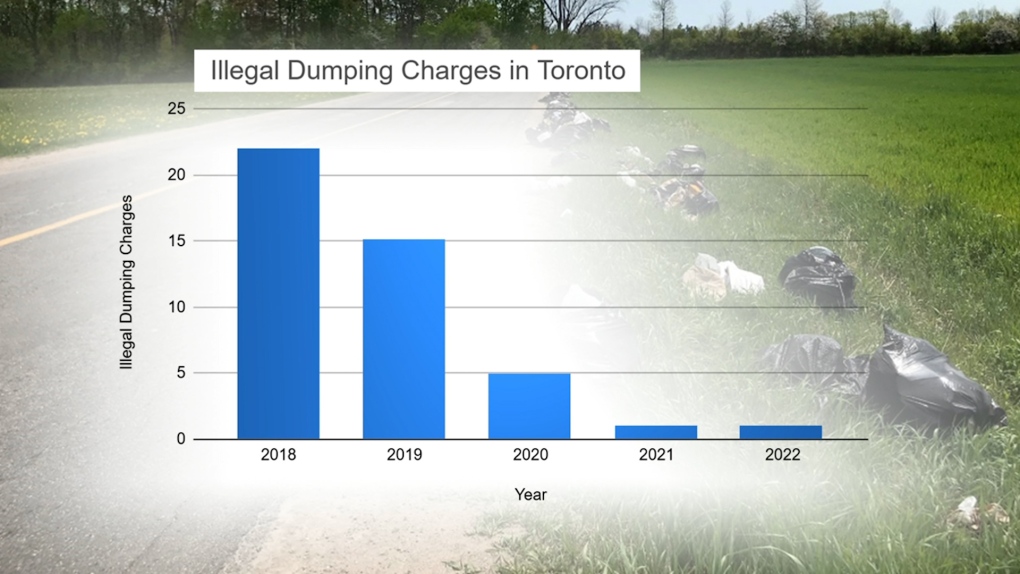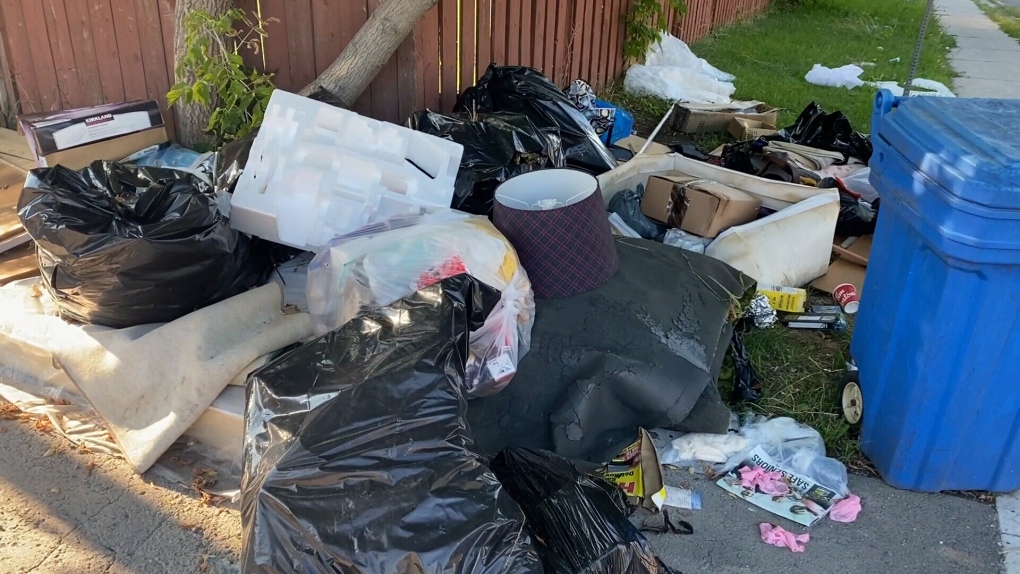Toronto budget problems could lay waste to city clean-up plans
As reports of illegally dumped trash on Toronto-area streets pile up, city officials say they want to clean it up -- but budget pressures from the pandemic and a new provincial law that reduces municipal revenue could lay waste to their plans.
With the City of Toronto facing a pandemic-related budget shortfall of more than $800 million, and many cities concerned about revenue losses one organization tallied at $5.1 billion over 10 years, municipal officials are not sure what the future holds.
- Download our app to get local alerts on your device
- Get the latest local updates right to your inbox
“We’re still looking at the impacts of Bill 23. We’re all very worried about that. We need to continue advocating for more revenue tools in our city,” said Toronto Councillor Jennifer McKelvie, who chairs the city’s Infrastructure and Environment Committee.
“We do know that coming out of the pandemic we have an enormous budget shortfall and need to make sure that those core services that are so important, like litter cleanup, like pickup of illegal dumping, all that needs to happen, so we’re all watching Bill 23 very closely,” she said.
McKelvie said she wants city staff to investigate what’s going on and come up with solutions that can reduce the trash.
A CTV News investigation discovered that 311 complaints of trash on public roadways more than doubled from about 300 in 2018 to more than 750 this year.
At the same time, those illegal dumpers are getting punished less. Charges have dropped from 22 a year to just one per year in the last two. That’s because officials were re-tasked with other jobs during the COVID-19 pandemic.
 The number of illegal dumping charges laid in Toronto over the last several years is seen in this charges.
The number of illegal dumping charges laid in Toronto over the last several years is seen in this charges.
Trash hauler “Big Ben” Bergeron told CTV News that he’s got one word he uses when describing the trash pickup business these days: “More.”
“I see it all the time on the street. I see people leave garbage in the park. They leave garbage everywhere,” he said.
One reason for the surge, he said, is the diesel price hikes that make it about 30 per cent more to commission a service like his to remove trash.
“People don’t want to pay to get rid of the garbage -- so they end up leaving it in the street,” he said.
That’s cheaper for the dumper, but costs money to clean up and investigate. And that money could be in short supply in municipalities across Ontario after the passage of the More Homes Built Faster Act earlier this week, said Milton Councillor Colin Best.
 A pile of illegally dumped trash in Toronto is seen in this undated image.
A pile of illegally dumped trash in Toronto is seen in this undated image.
The law was passed by the provincial government to encourage housing construction and increase housing supply. One tool was removing the ability of municipalities to charge developers in some situations.
But Best said the Association of Ontario Municipalities estimates provisions will result in $5.1 billion in losses over the next ten years, which can’t help but impact city services.
“We’re trying to stay positive. We’ve sent a letter to the minister of finance on how the province can fix this. We all want to work together, we want affordable and safe communities. The problem we’re facing is the costs of this is being downloaded to the municipalities,” he said.
When it comes to the waste itself, Best said he supports a producer responsibility system that would mean the manufacturer provides some financial incentive to return packaging, as with cans and bottles.
But in the meantime he said people should stop illegal dumping and clean up their messes.
“Didn’t your parents ever teach you to clean up after yourself? Most people are taught to clean up your room when you’re seven years old and you do it then,” he said.
CTVNews.ca Top Stories

Islamic State-inspired driver expressed desire to kill before deadly New Orleans rampage, Biden says
A U.S. Army veteran driving a pickup truck that bore the flag of the Islamic State group wrought carnage on New Orleans' raucous New Year's celebration, killing 15 people as he steered around a police blockade and slammed into revellers before being shot dead by police.
Calgary woman was planning to leave husband when he killed her and her father, brother says
The brother of Ania Kaminski, who was murdered by her husband on Dec. 29, described her as one of the most amazing human beings in the world.
'Cash poor' businesswoman is worth at least $20M, can pay off mortgage debt, B.C. court rules
A Vancouver businesswoman who claimed to be too "cash poor" to pay off a roughly $3 million mortgage debt – despite having claimed a net worth in excess of $94 million as recently as 2018 – has been ordered to pay up.
Canadian man, 38, dies in avalanche in Utah mountains
Authorities in Utah say a Canadian man has died in an avalanche while snowboarding in the mountains near Salt Lake City.
An aspiring nurse, football star, single mother and father of 2 killed in New Orleans attack
Officials have not yet released the names of the 15 people killed in the New Orleans New Year's Day truck attack, but their families and friends have started sharing their stories.
Firework mortars, gas cannisters stuffed inside Tesla that exploded outside Trump's Las Vegas hotel
Firework mortars and camp fuel canisters were found stuffed into the back of the Tesla Cybertruck that exploded outside U.S. president-elect Donald Trump's Las Vegas hotel early Wednesday, killing a suspect inside the vehicle and sparking an intense investigation into possible terrorism.
Financial changes in Canada you should know about this year
There are a few changes in federal policies that could affect Canadians' finances in the new year.
Gypsy Rose Blanchard gives birth to her first baby
Gypsy Rose Blanchard, who became infamous due to her role in the killing of her abusive mother, has given birth to her first child.
Watch The next big thing in AI in 2025, according to one tech analyst
Artificial intelligence isn't done disrupting our lives and compromising online safety, tech analyst Carmi Levy says.































